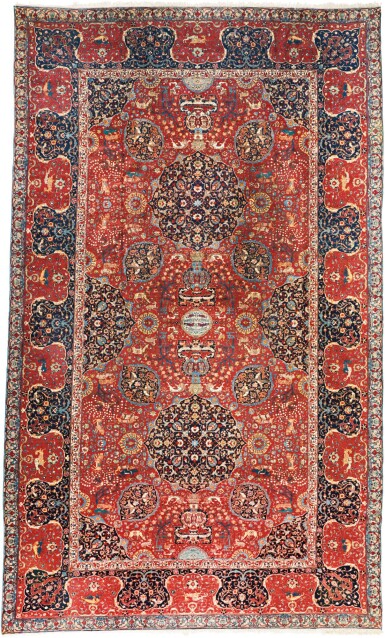Arts of the Islamic World & India including Fine Rugs & Carpets
Arts of the Islamic World & India including Fine Rugs & Carpets

The Property of a German family
A 'PETAG' TABRIZ CARPET, NORTHWEST PERSIA
Auction Closed
June 10, 06:00 PM GMT
Estimate
10,000 - 15,000 GBP
Lot Details
Description
The Property of a German family
A 'PETAG' TABRIZ CARPET, NORTHWEST PERSIA
circa 1920
with the 'Chelsea Carpet' design,
approximately 507 by 310 cm.
Please note: Condition 9 of the Conditions of Business for Buyers for this sale is not applicable to this lot.
The design for this carpet is taken from the 'Chelsea Carpet', in the Victoria and Albert Museum, Museum number: 589-1890. The V and A catalogue entry for the carpet notes: "The Chelsea Carpet is so called because the Museum purchased it from a dealer in Chelsea (in southwest London), named Alfred Cohen, in 1890. Aside from this, the carpet's provenance is not known, but its quality of design and production strongly suggests a court-level workshop in early sixteenth-century Iran." The German firm Persische Teppich-Gesellschaft (PETAG) was founded in Berlin in 1911 by Heinrich Jacoby (1889-1964). At his initiative, a large workshop was opened in Tabriz to weave carpets that maintained traditional quality against the perceived decline resulting from the mass commercialisation of weaving as a result of Western demand. Using lustrous wool and often vegetable dyes the company revived the art of weaving using old and elegant designs from the 16th and 17th century. Their production is usually marked with a cintamani motif. Jacoby is well-known for his authoritative publication 'Eine Sammlung orientalischer Teppiche' of 1923.
Please note that due to recent changes in the U.S. law, carpets and rugs of Iranian/Persian origin can no longer be imported into the U.S
